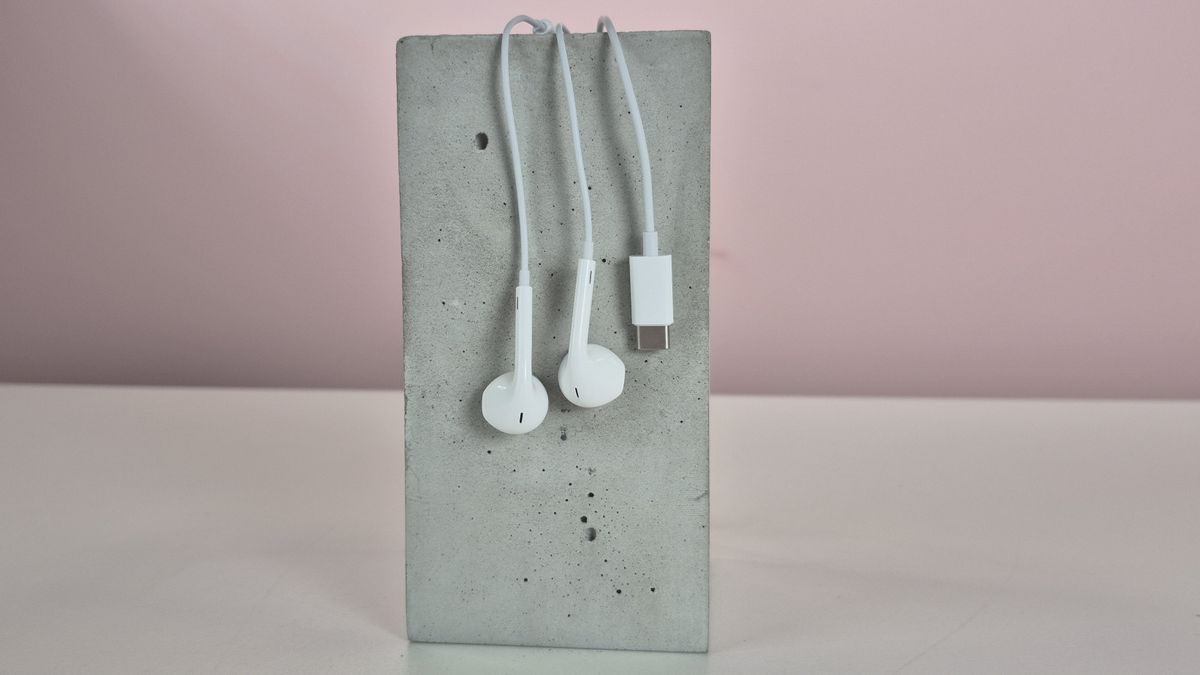Apple EarPods USB-C: Two-minute review
Reader, I want you to cast your mind back to the 2010s, maybe even the noughties – I’m sure many of you will have fond memories of plugging your wired Apple earbuds into your iPod, or perhaps even an early-gen iPhone. And my mind was cast back to this exact period as soon as I got my hands on the Apple EarPods USB-C. These wired earbuds may not fit your iPod anymore, but they’ll work with almost any modern handset – Apple or not – thanks to their USB-C connector. But do these buds merely open a window to the past, or do they craft a strong sonic experience in their own right?
Well, to find out, let’s start with sound quality. Perhaps unsurprisingly, you’re not going to get next-level performance from the Apple EarPods USB-C; after all, they only cost $19 / £19 / AU$29. But for the most part, they do still offer adequate audio. I rarely felt that treble was too grating or that overall sound was tinny – an issue that a lot of cheap competitors are guilty of. On top of that, you get a decent helping of bass – even if it’s not ultra-clear or able to stretch to extreme depths. Given these also support Apple lossless audio, at a glance they seem decent for general audio quality – but let’s drill into the details.
I tried listening to Young Blood by The Naked and Famous and quickly identified one key issue. The electric guitar that blares throughout the track is meant to have a well-defined position in the mix – in the lower-mid range, separated from the bass – to uphold the track’s powerful, full-sounding profile. However, it really didn’t sound all too distinct, coming through slightly muddied with sounds in the low-end – an issue that you won’t experience with some of the best wired earbuds.
And speaking of that low-end, you’re not going to be blown away with incredibly clear quality. For instance, I played Ma quale idea by Pino D’Angiò and the iconic, funky bassline was uncharacteristically muddy. This muddiness almost smothered D’Angiò’s smooth, deep vocals, cluttering the soundstage. Despite that, actual bass levels are respectable – you get a solid amount of low-end weight for some super-cheap wired buds, even if clarity isn’t top-drawer. You won’t get tasty sub-bass though. I tried listening to The Boys Are Back In Town by Yung Gravy and although sub-bass was audible, it lacked its imposing, ground-shaking boom.
The lack of bite was also apparent with treble elements in Rains again by Solji and the vocalist’s high notes – despite avoiding the abrasiveness some cheap buds inflict – failed to reach their grandiose, showstopping potential, sounding slightly dulled and restrained.
Something that I feel diminishes the listening experience significantly is actually nothing to do with audio quality, though. That’s right: I’m talking about the fit of the Apple EarPods USB-C. These earbuds don’t have eartips, so you don’t get a proper seal with them. This looser fit means that sound isn’t perfectly concentrated and the buds will sometimes feel as if they’re falling out of your ears. This can be quite frustrating when you’re on the move; I found myself readjusting to get a more snug feel a little too often for my liking. It is worth noting, though, that some may find wearing buds with eartips for extended periods uncomfortable – so your impression of the fit itself will vary depending on personal preference.
A less debatable flaw of the relatively loose fit of the EarPods is that it allows a lot of external noise to seep through. Again, the lack of eartips removes what is typically a passive protective layer, so I often heard colleagues talking in my office or cars zooming by while on walks. If shutting out the wider world is a top priority, I’d simply recommend not grabbing these – there are better wired options for noise isolation, like the SoundMagic E80D or cheap wireless buds with active noise cancellation, like the Earfun Air Pro 3.
But on a positive note, these are a very elegant pair of wired buds – in fact, a lot of budget competitors can’t even come close in the style department. They are a fair bit heavier than a lot of competitors at 1.1oz / 30g, but they never felt heavy in-ear or irritating to wear for longer listening sessions. The drivers are encased in the classic white glossy housing that Apple fans will be well accustomed to. The wire is also slim, rounded and not too bad of an offender when it comes to cable noise – which is still noticeable, but not overwhelming. The USB-C connector here is also pleasingly compact and never got in the way when I was holding my phone.
Finally, the included controller is sleek and well-sized, though it did sit a little closely to my cheek – if it was slightly further down the wire it would be perfect. It includes volume and play/pause controls for music and taking phone calls, as well as a mic. And in terms of quality, the mic is pretty standard. Vocals were decently clear on a voice recording and phone call, although there is some noticeable static in the background – something that’s typical for cheap and even some less cheap buds.
So, at the end of it all, where do I stand on the Apple EarPods USB-C. Did they provide a fun, nostalgic ride for me? Sure, they still have the token Apple charm, sleek looks and minimalist design, and the wired look is aesthetically pleasing, in my view. But did they impress me in terms of audio quality? Well, not quite. The soundstage is a tad messy, with instruments often failing to find a defined pocket to play in. But having said that, there’s not too much tinniness or unpleasantly aggressive treble sounds that you get with a lot of cheap wired buds. Overall, then, the Apple EarPods USB-C are pretty solid given their low price – that is if you can deal with their lack of ear tips.
Apple EarPods USB-C review: Price and release date
- $19 / £19 / AU$29
- Launched in 2023
The Apple EarPods USB-C released in 2023 and are the tech giant’s debut in the wired USB-C world. One of the most attractive things about these buds is their super-low price. They’re available for just $19 / £19 / AU$29 – that’s in-line, or cheaper than a lot of competitors. You can only get them in one color, White, but that was no issue in my book, given the glossy, bright look suits them to a tee.
Apple EarPods USB-C review: Specs
| Drivers | Dynamic |
| Weight | 1.1oz / 30g |
| Frequency range | 20Hz-20KHz |
| Waterproof rating | Not stated |
Should you buy the Apple EarPods USB-C?
| Attributes | Notes | Rating |
|---|---|---|
| Features | Attractive, slim controller with solid mic, lacking noise isolation though. | 3.5/5 |
| Sound quality | Audio is adequate and not too tinny but can lack separation and clarity. | 3.5/5 |
| Design | Very elegant minimalist design although fit will be too loose for many. | 3.5/5 |
| Value | Overall quality may not be top-class, but these are worth their ultra-low price. | 4.5/5 |
Buy them if…
Don’t buy them if…
Apple EarPods USB-C review: Also consider
| Row 0 – Cell 0 | Apple EarPods USB-C | Skullcandy Set USB-C | SoundMAGIC E80D |
| Price | $19 / £19 / AU$29 | $31.99 / £29.99 (about AU$50) | $44 / £39.98 / AU$66 |
| Drivers | Dynamic | 9mm dynamic | 10mm dynamic |
| Weight | 1.1oz / 30g | 0.53oz / 15g | 0.56oz / 16g |
| Frequency range | 20Hz-20kHz | 20Hz-20kHz | 15Hz – 22kHz |
| Waterproof rating | Not stated | IPX4 | Not stated |
Apple EarPods USB-C review: How I tested
- Tested for one week
- Used in the office, at home and while on walks
- Listened using both Apple Music and Tidal
I tested the Apple EarPods USB-C over the course of one week. I used them while using Apple Music on the iPhone 16 as well as with Tidal on the Samsung Galaxy S24 FE. I also played tunes on Spotify and watched video content via YouTube. I tested the EarPods USB-C in the office, at home and while out on walks near busy roads.
When listening to music I played tracks from the TechRadar testing playlist, which contains songs spanning a variety of genres – though I also spent hours blasting bangers from my personal library. When appropriate, I compared these buds to the similarly priced Skullcandy Set USB-C, in order to better assess audio quality, comfort and elements of design.
- First reviewed: November 2024
- Read more about how we test
Read the full article here














